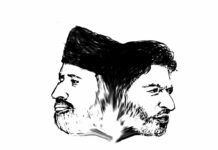
Ajaz Lone
Dr Allama Iqbal is one of the pioneers of contemporary Islamic resurgence. Hundreds of books have been written on Iqbal’s thought in all major languages. Although Allama used both Urdu and Farsi (Persian) languages to express his thoughts, his intellectual output in Persian is more voluminous than Urdu. Javed-nama, his magna opus, has been acclaimed as a classic of Persian literature. But until 1970s, most of the readers of Persian literature remained unaware of his message.
It was Dr Ali Shariati — a prominent Iranian social reformer, whose scholarly work on Iqbal helped the readers of Persian literature gain insight into the message and thought of Iqbal.
Ali Shariati’s scholarly work on Iqbal in Persian has been published in the form of a book titled Ma wa Iqbal (We and Iqbal). It is based on his lectures at a conference on Iqbal (Husainiyah Irshad) and the text Shariati wrote before his death in 1977.
In the preface, Dr Shariati writes, “Iqbal is a multi-faceted individual. He thinks like Bergson. He loves like Rumi. He plays the songs of his faith like Nasir Khusraw. He fights with colonialism for the liberation of Muslim nations as Sayyid Jamal had done. He endeavours to save civilization as Tagore had tried to do from the tragedy of calculating reason and the pest of ambition. Like Carrel, he holds the hope and the aspiration to be able to revive love and the spirit in the harsh life of modern man. Like Luther and Calvin, he makes his goal the revival of his religious thought and an Islamic Renaissance in this age.”
In first chapter, “A Manifestation of Self-reconstruction and Reformation,” Dr Shariati observes that if one were to reconstruct the form of Islam which has been made to degenerate in the course of history…then, that exemplary Muslim personalities will be reconstructed and reborn like Mohammad Iqbal. Shariati describes the ‘poet of east’ as a great mystic with a pure spirit and a man who respects and honors science, technological progress, and the advancement of human reason in our age.
In second chapter, “Not deceived by the West,” Shariati expounds on the influence of the West on Iqbal. He points out that Iqbal understood the West from close quarters. “Iqbal ascends to the highest intellectual summit in the West and understands the value of European science and technology,” he writes. “The nature of Iqbal’s thought is derived from a nation which is historically and culturally characterized by fineness of sentiments, tenderness of imagination, purity of spirit, idealism of heart, illumination, and inspiration.”
In third chapter, “Ideology,” Shariati discussing Iqbal’s ideology observes it is he who gave ideological consistency to Sayyid Jamal’s revolutionary uprising. Iqbal, Shariati writes, gave deep, intellectual roots to his fertile and sturdy tree. “After years of mixing and learning in schools of thought whose masters were wondrous genius of the new culture such as Hegel, Nietzsche, Kant, and Goethe, this invulnerable hero [Iqbal] of European thought, philosophy, and culture, threw it all down at the feet of the Rustom of poetry – Rumi – to blind him with the dazzling light of the arrow of love.”
In fourth chapter, “World View,” Shariati analyzes the foundations of Iqbal’s message. He observes that one of the most fundamental characteristics of Iqbal’s world view is his anti-philosophical aggressiveness and that Iqbal’s intellectual orientation rests on a solid foundation in the history of Islamic culture. Shariati writes, “Iqbal’s anti-philosophical position represents such an original and profound attitude which, throughout our history, has characterized intellectual disputes and ideological wars.”
Dr Shariati believes that in order to understand the secret of Dr Iqbal’s ‘self’, one has to know the limits of philosophical-scientific consciousness, and realize that it stops at the boundary of facts.
For Iqbal, writes Shariati, one who drinks the intoxicating wine of deeds is a mujahid.
(Ajaz Lone is the PhD scholar in IICP, University of Kashmir)















